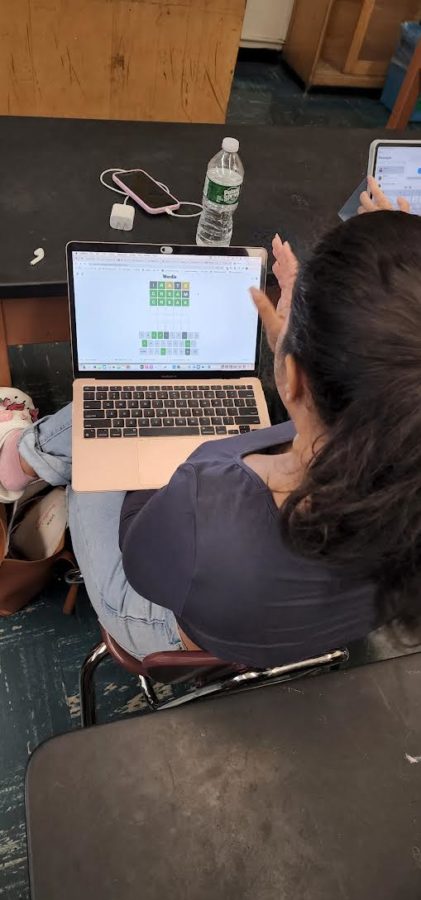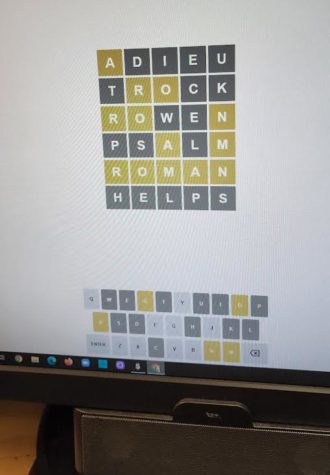The Wonderous World of Wordle
An online word game has recently taken the Internet by storm — but what is it about Wordle specifically that attracts such a wide range of people?

Eldisa Rosario ‘22 always uses ‘IRATE’ as her starting word, and it proves effective this time, as she gets the solution on her third try.
Whether you’re an ‘ADIEU’ advocate or a ‘CRANE’ connoisseur, it can’t be denied that Wordle continues to have a hold on people over half a year since its release.
Since December of 2021, this simple yet addictive online game has had its signature green, yellow, and black boxes plastered all over Facebook, Twitter, Discord, and other social media platforms. Every day, people from all walks of life go into The New York Times website to find Wordle and begin guessing the five-letter word of the day in six tries or less. The game displays five colored boxes that correspond to the letters in each guess that the player submits: green indicates correct placement, yellow indicates incorrect placement, and black indicates that the letter is not in the word at all.
The simplicity of Wordle attracts a diverse audience of all ages, and the halls of Bronx Science are no exception — the game is played by students and teachers alike. Although the word of the day is the same for all players, the strategies and techniques that participants employ to find the daily solution varies greatly depending on who is playing. Much of the discourse pertaining to this online word game is with regards to the starting word, of which players have no prior guesses and hints to rely on. A survey sent out to randomly selected Bronx Science students found that the most popular starting word was ‘ADIEU,’ followed closely by ‘AUDIO,’ both of which have the benefit of containing four out of five vowels in addition to a common consonant. Another popular choice among students is ‘CRANE,’ which was discovered by the WordleBot to be the most efficient starting word. Less popular but surprisingly prevalent choices included words like ‘OUIJA’ and ‘PIQUE,’ both of which incorporate some more uncommon letters.

Yet there are other players who choose to switch things up each day rather than have one starting word to abide by. Louisiana Stahl ‘23 falls under this category. “It’s not as effective as people may think,” Stahl said, referring to the same word strategy. “Because when you change it up, you have a fighting chance each day to get it right in one go.”
While the vast majority of players guess one word at a time, using hints from all the previous guesses to make their subsequent guess, there are a vocal few who try multiple words at a time, tackling more key letters and then using the hints all at once. “It’s super effective for knocking all the vowels out,” said Rohan Oza ’22. The most extreme version of this strategy which has been popularized on the Internet is to use five guesses that contain twenty-five different letters, and then unscramble the colored boxes for the final guess. One set of words that uses every letter in the alphabet except X goes as follows: “GLENT, BRICK, JUMPY, VOZHD, WAQFS.” Many Bronx Science students have had some strong opinions with regards to this formulaic strategy. “It works, but it’s also kind of a cop out,” said Suhani Madan ’22. “Part of the fun is trying to get it done in the lowest number of tries possible, so getting to six tries every time defeats the whole point.”
There are also a bunch of Wordle alternatives that have emerged, all of which follow a similar structure to the original game but add their own unique twist. Those who are not satisfied with only playing Wordle once a day can try their hand at spin-offs like Dordle, Quordle, and Octordle, which force players to simultaneously guess two, four, and eight words, respectively. In addition, Metzger Media Projects has a number of Wordle spin-offs including Wordle Race, in which players compete against other players to guess the word as quickly as possible. Other variants include Animordle, in which guesses are limited solely to animals, and Semantle, in which players must guess words that are semantically similar to the daily solution. There are even a few Wordle variants that deviate entirely from guessing words — for instance, Heardle, which adds an auditory component, and Subwaydle, which incorporates the New York City subway system into the game.
Although the concept of Wordle is quite simplistic and minimalistic, the immense following that it has accumulated over the past few months since its release, as well as the numerous spin-off games it has induced, proves how games do not necessarily have to be complex to be fun. While players may have diverging opinions in terms of the best starting word and the strategies one can employ to pinpoint the word of the day, we can all agree that the game has managed to ‘PIQUE’ the interest of the Bronx Science community.
The simplicity of Wordle attracts a diverse audience of all ages, and the halls of Bronx Science are no exception — the game is played by students and teachers alike.
Chris Yang is a Staff Photographer and an Editor-in-Chief of ‘The Observatory,’ as well as a Staff Reporter for ‘The Science Survey.’ He joined...










